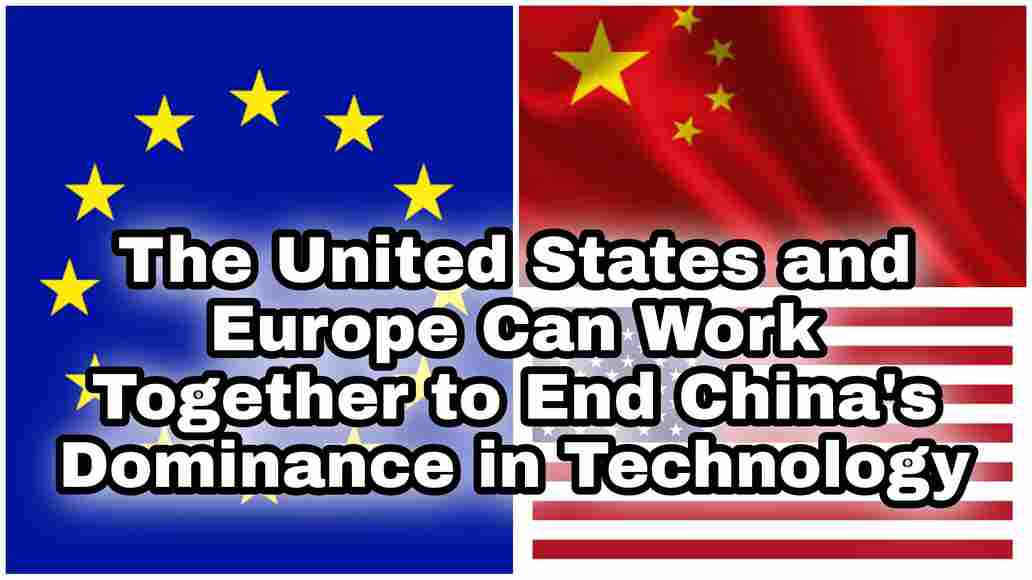The United States will now have to compete with Europe for China's technological dominance
Introduction:
Tensions between the United States and China are rising. China wants supremacy in various matters while the United States seems to have its supremacy at stake. Europe is also worried. Supporting the United States has caused it many problems.
Now he is being forced to side with the United States against China. Political analysts say the United States and Europe must work together to prevent China from ruling the world. The article under review is in this context.
Both the wording and the style of writing this article show how serious and disturbing this issue is. Western political and economic analysts have begun to pave the way for China to go against it as the biggest real threat.
Western governments and policymakers are being urged that the United States and Europe must work together to prevent China from moving forward.
Why is the US-Europe partnership important?
During the Cold War, the United States and Europe shared a common enemy of the Soviet Union. This partnership was in defense matters. Then there was no economic challenge from the Soviet Union. Now there is the Cold War atmosphere.
This time around, the biggest threat to US and European supremacy is in the form of China. This time the challenge is economic. So far, China has not focused on increasing its military presence.
The United States and China have to face China on the technology front. China has transformed itself into a manufacturing shop through four decades of tireless work. Neither the United States nor Europe can compete with China in this area because China is a big market instead of itself, there is a standard workforce and investors from all over the world are attracted to it.
In his book, The Rise of China's Industrial Policy 1978 to 2020, Barry Knut not limited China to transforming itself into a manufacturing shop, but now sought to assert its superiority in the field of technologies. Is busy China wants to make inroads in robotics, biotechnology, artificial intelligence and other technologies.
The question is not just about establishing superiority. China has also tried to achieve a lot through the state-sponsored capitalist system. There are fundamental differences between the industrial policies of the United States and China in many respects. The United States and Europe have so far focused on basic industrial training, with a strong emphasis on infrastructure and research and development. On the other hand, the Communist Party of China, which dominates the economy, wants to ensure economic and technological superiority in any way.
Businesses in the United States and Europe also face stiff competition from China in the open market, and much is happening behind the scenes. The Chinese leadership discriminates against American and European businesses. Taxes create difficulties for them. Theft of intellectual property is also not considered a vice. China's development as a whole is due to imitation.
China is taking advantage of being a big market. It has an extraordinary workforce. There has never been a shortage of skilled and trained people. There is no shortage of investors in China. Investors from around the world are flocking to China. The United States and Europe currently have the largest share of the global technology market.
China is also trying to provoke him. China is trying to increase its share in one way or another. For a time, China learned the ways of the West and set up its own manufacturing shop. The same approach is now followed in high-tech cases. Former US President Donald Trump and Japan worked together to bring down the level of production in China, but it was not possible. It's all about the workforce and the size of the market.
China now wants to ensure a clear lead in high-tech. The United States has Silicon Valley, where high-tech firms are concentrated. The Chinese leadership wants to turn the whole country into Silicon China. The Chinese leadership wants to make its mark not only in the IT sector but also in every advanced technology.
There was a time when Hong Kong, Singapore, Taiwan and South Korea were called Asian Tigers. China wants to take itself to a point where there is no one to challenge its supremacy. The so-called Asian tigers also embraced democracy and believed in the rule of law. China just wants the upper hand, that is, the way forward.
There is clear government control over most economic affairs. In such a situation, there is no room for democracy to flourish.
Under the leadership of President Xi Jinping, China is once again moving towards a Maoist style of government. China wants to ensure its superiority in all emerging high-tech industries in a way that no one in Asia, not even in the West, can easily face.
If China takes the lead in the high-tech sector, it will also become militarily strong. In that case, it would be difficult for the Western world to maintain its supply of various commodities.
The time has come for the United States and Europe to end their wars and unite against China. The dispute between Airbus and Boeing has made matters worse. Forgetting all this, the real challenge is to keep an eye on China. The United States and Europe will also have to give concessions to each other in terms of tariffs on various products.
Strong countries like France and Germany have started moving towards digital sovereignty in this regard. US companies have to compete with Europe in the high-tech sector to compete with China. It's not just a matter of technical expertise, but also of dealing with China's misguided policies and tactics.
There is so much to think about and so much to do with cybersecurity. Investments should also be examined. If a major dispute arises, it must be taken to the WTO. Joint measures are also needed to control exports. No country or region alone can ensure complete mastery of all technologies. Not without co-operation in this matter.
Government agencies in the United States and the European Union will also be on the path to greater cooperation. Horizon 2020 in the European Union and the National Science Foundation in the United States are suitable institutions in this regard.
Summary/Conclusion:
The main competition in the high-tech sector now is 6G, energy storage, batteries, automation systems, quantum computing and semiconductors. The question is not just about collaboration between institutions. Universities and governments also have to come together and try on a platform. Scientists and engineers in the United States and Europe should be allowed to move freely in each other's territories.








0 Comments